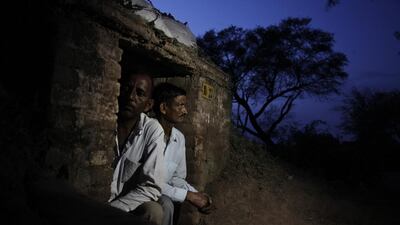NEW DELHI // Weeks of deadly cross-border firing in the disputed Kashmir region continued on Thursday despite a meeting between Indian and Pakistani military officials.
Pakistani rangers fired at Indian Border Security Force (BSF) posts in the Pargwal sector of Jammu and Kashmir state at 11pm on Wednesday, just hours after the meeting, and again just before 2am on Thursday, according to Indian army. A third barrage followed at 4am, to which Indian troops retaliated, resulting in an exchange of fire that continued for two hours.
At the meeting on Wednesday between high-ranking Indian and Pakistani army officers, Pakistan accused India of “blatantly firing on Pakistani positions”, the Press Trust of India reported.
India, for its part, has said Pakistan violated the 2003 ceasefire on the border more than 20 times in the past two weeks, frequently using mortars in addition to machine guns and small arms.
Gen D K Pathak, the director of the BSF, described the Pakistani attacks as “the heaviest cross-border firing I’ve seen since the 1971 war”.
Gen Pathak said the firing began in mid-July, when a BSF soldier was killed by a Pakistani sniper.
No casualties or damage were reported on Wednesday night or Thursday morning, but over the past two weeks at least 10 people have been killed and more than a dozen injured on both sides.
On the Indian side, villagers living near the border in Jammu region have been forced to abandon their homes.
“We have provided most of the facilities, like food, medicare, tents, to over 3,000 people, mostly women, children and elders displaced from border hamlets due to Pakistani firing,” an Indian army spokesperson said on Tuesday.
India has claimed in the past that such firing into its territory is to provide cover for terrorists trained in Pakistan to enter Kashmir.
Prime minister Narendra Modi lambasted Pakistan for its support of cross-border militancy during his visit this month to Kashmir.
Speaking to Indian troops, he said: “The neighbouring country has lost the strength to fight a conventional war but continues to engage in the proxy war of terrorism.”
The firing from the Pakistani side, beginning in mid-July, continued for 10 days before lapsing into a relative lull. It intensified again around the time of Mr Modi’s visit to Kashmir.
On August 19, Mr Modi’s government called off talks between the countries’ foreign secretaries, ostensibly because the Pakistani high commissioner in India met Kashmiri separatist leaders. In the days since, the firing became even more intense.
In this context, it is entirely possible that the recent skirmishes have a “political direction” to them, said P R Chari, a visiting professor at the Institute of Peace and Conflict Studies in New Delhi and formerly a secretary in India’s defence ministry.
“It’s possible, for instance, that Pakistani soldiers on the border have received instructions, saying that the Indians have cancelled talks and that it’s time to heat up the atmosphere and bring them to the table again,” Mr Chari told The National. They may have also been instructed to step up attacks while Mr Modi was in Kashmir, as a show of brazenness or strength, he said.
“Equally, on our side, Modi has to show that he is a strong leader. If he wants to flex his muscles, this is one way of doing it.”
Contrary to the claims of both sides, Mr Chari said that “rarely, if ever, are such exchanges of fire entirely unprovoked”.
But on the ground, a medley of factors could also have contributed to the clashes.
“In many cases, the border may not be cleanly demarcated on the ground,” Mr Chari said. “It may only be generally understood that it runs from this tree to that tree, for example.”
In torrential rain, physical markers may get moved or displaced altogether. “In such conditions, both sides will naturally try to improve their positions, and this will result in some tension,” he said.
A sincere meeting between army commanders, with sound information about ground conditions and little political manipulation, can still ease border tensions in such situations, Mr Chari said.
ssubramanian@thenational.ae

